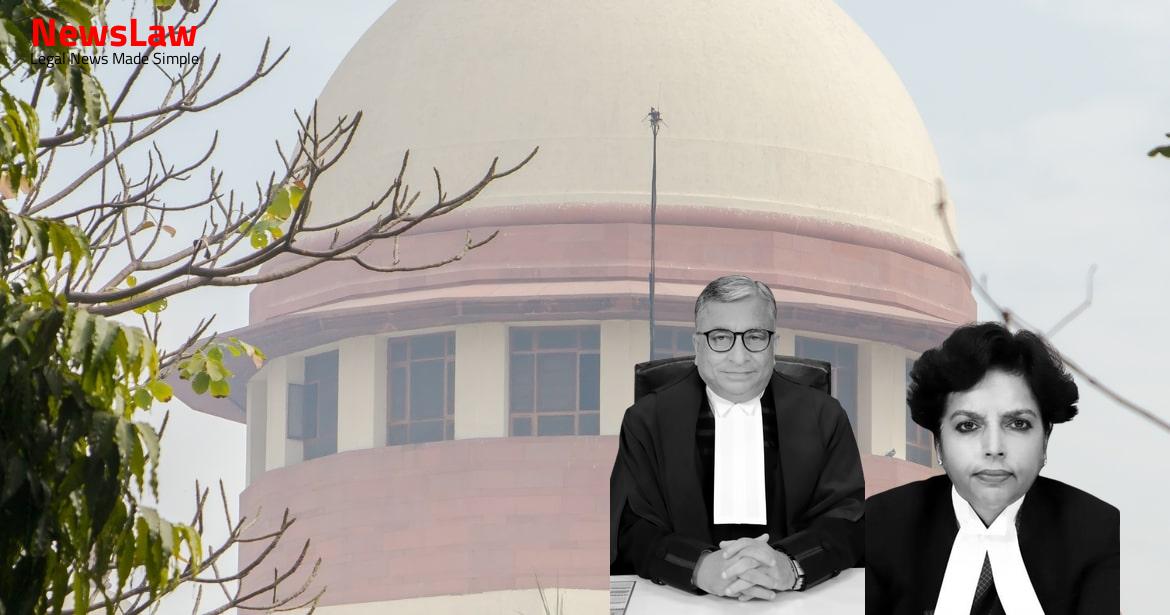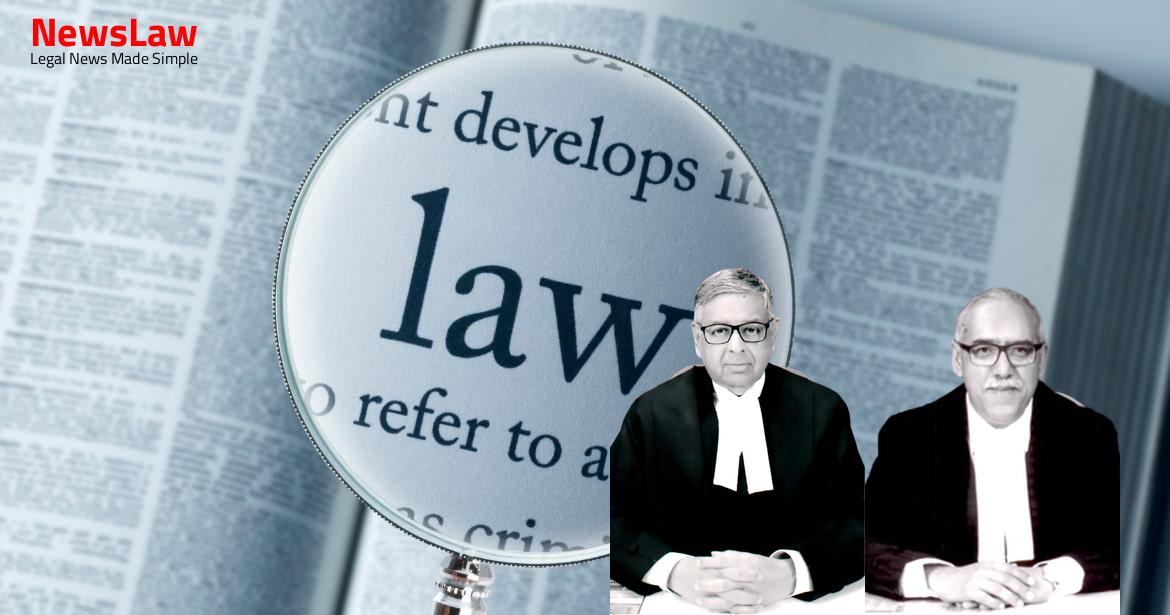The High Court of Gauhati at Itanagar recently dismissed the criminal petition (No. 36(AP) of 2017) filed by the original accused nos. 1 & 2 in the case of SPML Infra Limited against the Government of Arunachal Pradesh. The appellants, the Managing Director and Director of SPML Infra Limited, sought to quash the criminal proceedings in G.R. Case No. 05/200/294. The case involves allegations of supplying sub-standard turbines for the Nurang Hydel Power Project. Stay tuned for more updates.
Facts
- The High Court of Gauhati at Itanagar dismissed the criminal petition (No. 36(AP) of 2017) filed by the original accused nos. 1 & 2.
- The appellants were seeking to quash and set aside the criminal proceedings in G.R. Case No. 05/200/294.
- The appellants are dissatisfied with the judgment and order dated 07.09.2018.
- The present appeal has been filed by the original accused nos. 1 & 2 against the impugned judgment and order.
- M/s SPML Infra Limited had a contract with the Government of Arunachal Pradesh for the Nurang Hydel Power Project.
- The defect liability period for the works was 18 months as per the contract.
- The project became operational and started generating electricity after the expiry of the defect liability period.
- Damaged turbines were found during an inspection post-operation of the project.
- An FIR was lodged against M/s SPML Infra Limited for supplying sub-standard turbines with incorrect material composition.
- Charges were pressed under Section 120-B and 420 of the IPC against the appellants for alleged cheating by providing inferior quality materials.
- Investigation revealed irregularities in awarding the contract at a higher price and officials were found responsible for neglect of duties.
- A complaint was lodged against the appellants for non-compliance with the contract terms and providing inferior quality materials.
- Disputes arose regarding maintenance payment leading to the appellants issuing a notice to take over the project due to non-payment.
- Appellant No. 1 is the Managing Director and Appellant No. 2 is the Director of M/s SPML Infra Limited, a public limited company.
Also Read: Interpretation of Lease Agreement and Compulsory Registration
Arguments
- The appellants argue that they cannot be held guilty of cheating based on a mere margin difference between manufacturing costs and quoted rates.
- They were awarded the contract as the lowest bidder after due deliberations by the tendering committee.
- There is no evidence of fraudulent intention in the FIR from the initiation of the transaction.
- The appellants argue that changing the turbines after being informed of defects shows good faith, not fraud.
- They emphasize that without the main company being joined as an accused, criminal proceedings against directors alone are not maintainable.
- The appellants claim that the criminal dispute is an attempt to convert a civil matter unlawfully.
- The prosecution alleges that the appellants supplied sub-standard materials at exorbitant rates knowingly, intending to cheat the government.
- The appellants contend that the allegations do not disclose a prima facie cognizable offense.
- It is argued that the proceedings have been filed with a malafide intention after a demand for payment was made by the company.
- The appellants stress that they are not vicariously liable for the actions of the company, as no allegations are made against it.
- The High Court’s failure to consider the appellants’ role and the expiration of the defect liability period are highlighted.
- It is further argued that the chargesheet goes beyond the original allegations in the FIR.
- The State opposes the appeal, citing a prima facie case under Section 420 IPC against the appellants.
- Various legal precedents are referenced to support the appellants’ plea to quash the criminal proceedings.
- The learned counsel representing the respondents argue that the submissions made by the appellants are their defenses and should be considered during the trial.
- The investigating agency has filed a chargesheet against the appellants and other accused under Section 420 read with 120B IPC for offenses including criminal conspiracy.
- The High Court rightfully declined to quash the criminal proceedings under Section 482 Cr.P.C., noting that such powers should be used sparingly and in exceptional cases.
- It is not feasible at this stage to separate only the appellant’s case, as emphasized by the High Court.
Also Read: Enhancing Compensation and Modifying Sentences: A Legal Analysis
Analysis
- The appellants have been charged with offences under Section 420 read with Section 120B of the IPC.
- Several decisions of the Court on using powers under Section 482 Cr.P.C. are referenced.
- The complaint lacks specific allegations of fraudulent or dishonest intention at the time of contract.
- Categories of cases for exercising powers under Section 482 Cr.P.C. are outlined.
- Allegations must make out a case against the accused for further proceedings to take place.
- The project started in 1996 and the defect liability period ended in January 1998.
- No specific allegations of intentional deception or fraudulent intention from the beginning of the transaction.
- The main allegations seem to be directed at the company, M/s SPML Infra Limited.
- The appellants, as office-bearers, did not show fraudulent or dishonest intention during the transaction.
- The turbines with defects were immediately replaced indicating no intention to cheat the government.
- No specific allegations of fraudulent and dishonest intention in the FIR or chargesheet against the appellants.
- M/s SPML Infra Limited is not a party to the case, and there are no specific allegations against the Managing Director or Director.
- The chargesheet lacks allegations of vicarious liability against the appellants.
- The High Court refused to quash the FIR and chargesheet against the appellants under Section 482 Cr.P.C.
- In the absence of specific allegations against the Managing Director or any officer of a company, no proceedings can be initiated without the company being a party.
- Vicarious liability of Managing Director or Director can only exist if provided in the statute.
- Statute must contain provisions fixing vicarious liabilities for proceedings against Managing Director or Director.
- Allegations must be made to attract provisions constituting vicarious liability.
- Criminal proceedings required to be quashed against appellants due to lack of specific allegations.
- High Court erred in not quashing the proceedings after a delay of approximately 13 years in serving summons.
- Exercise of powers under Section 482 Cr.P.C. to quash criminal proceedings against appellants.
- Manifestly mala fide or malicious proceedings should be dismissed to avoid private vendetta.
- The judgment discusses situations where there is a legal bar engrafted in the Code or concerned Act against institution and continuation of criminal proceedings
- It also mentions cases where the Code or Act provides a remedy for the grievance of the aggrieved party
- Specific provisions in the Code or Act are highlighted as sources for redress in such situations
- The criminal proceedings against the appellants are quashed due to undue harassment.
- FIR and chargesheet for the offence under Section 420 IPC are hereby quashed specifically for the appellants.
- The proceedings will continue against other accused individuals.
- No prima facie case for the offence under Section 420 IPC is established.
Also Read: Exemption from Property Tax for Central Government-owned Buildings
Decision
- The instant appeal has been allowed.
- The impugned judgment and order passed by the High Court has been set aside.
Case Title: SUSHIL SETHI Vs. THE STATE OF ARUNACHAL PRADESH (2020 INSC 118)
Case Number: Crl.A. No.-000125-000125 / 2020



